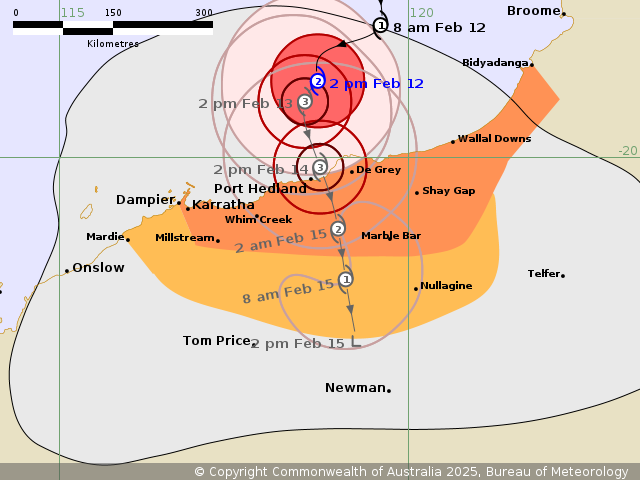A powerful tropical cyclone is brewing off the Western Australian coast, threatening to bring heavy rainfall and flooding to the Pilbara region.
Tropical Cyclone Zelia, a category two system, is expected to intensify to category three strength by Thursday as it approaches the coast.
What to Expect
The Bureau of Meteorology has warned that the cyclone will bring rainfall totals of up to 500 millimeters, with flooding being the biggest concern for inland communities.
The region has already experienced above-average rainfall this summer, and river systems are expected to respond quickly to the heavy rain.

“The region has had a lot of rainfall already, and the rivers are very sensitive to any additional rain,” said James Ashley, Bureau state manager.
“We’re expecting very heavy rainfall, in excess of 500mm, over the course of this event. That’s significant for the Pilbara.”
Affected Areas
Communities south of Broome, through to Mardie and inland to Nullagine, are being warned to prepare for the storm to hit.
Port Hedland has already received 75mm of rain since last night, and Pardoo has recorded 82mm.
The heavy rainfall will be welcomed by pastoralists in the region, who have historically dealt with dry conditions during the northern summer months.
Highway Closures
The Department of Fire and Emergency Services (DFES) has warned that major highways, including the Great Northern Highway, are expected to close as the cyclone approaches the coast.
“We will see the Great Northern Highway close at some point as a way to protect road users,” said Leon Gardiner, DFES Kimberley Superintendent.
“People and travelers in the region need to be mindful of that, and it could happen Thursday.”
Preparation is Key
Residents are being urged to prepare for the storm and not leave it until the last minute. “If we see winds above 125kph, we’ll escalate to a cyclone watch-and-act,” said Superintendent Gardiner.
“This is when you should be finalizing your preparedness activities, not starting them.”
Tips for Staying Safe
-
Make sure you have a plan in place for you and your family
-
Stock up on supplies, including food, water, and medication
-
Stay informed about the latest weather updates and warnings
-
Avoid traveling to the affected areas unless necessary

